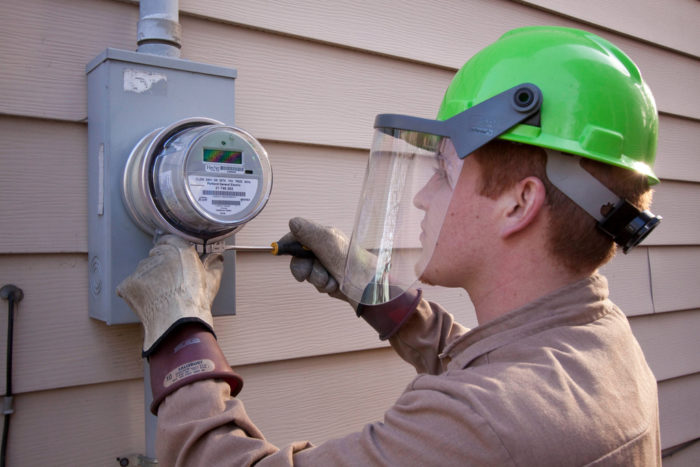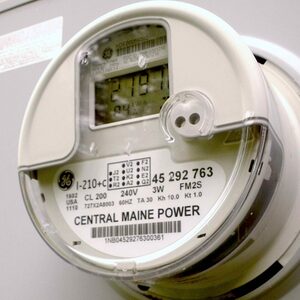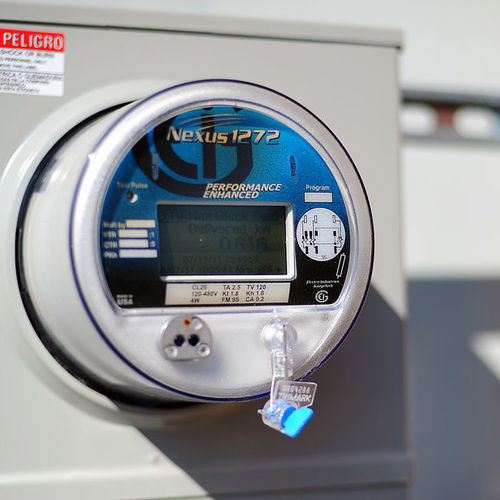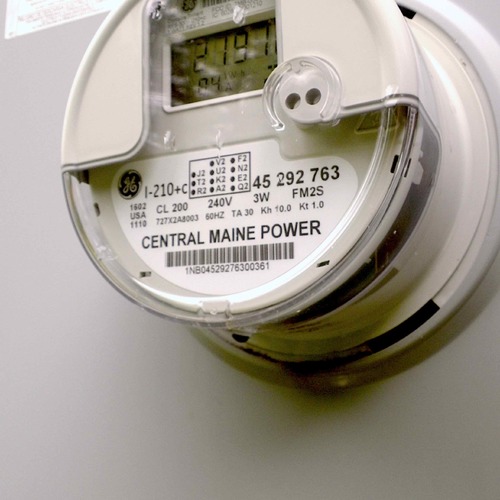
Image Credit: Portland General Electric/CC BY-ND/Flickr
Wi-fi connected smart meters let utilities track how much electricity customers are using in real time, triggering warnings to cut back when demands on the grid are too high. Now, a Chicago utility has agreed to study whether the meters are effective in reducing greenhouse gas emissions.
In a deal involving the Environmental Defense Fund, Commonwealth Edison, and the Illinois Citizens Utility Board, ComEd has agreed to test whether customers who have smart members use less electricity than customers who don’t have them.
In a post at Midwest Energy News, E&E Publishing reports that ComEd will compare how electricity use differs hour by hour between customers with and without smart meters. If smart meter programs successfully prompt customers to shift their use of electricity to non-peak hours of the day, there would be less of a need to bring on power plants to meet peak demands and, consequently, fewer greenhouse gas emissions.
“The ability to calculate the environmental benefits of clean energy investments like smart meters is critical to accelerating the new energy economy,” the Environmental Defense Fund (EDF) said.
The test is the result of a law passed by the Illinois state legislature in 2011 permitting ComEd and Ameren Corporation to get higher utility rates if they invested in advanced meters and met other conditions, E&E said. EDF and the Citizens Utility Board then petitioned the state’s Commerce Commission to require the utilities to measure greenhouse gas emissions as part of the deal.
Peak time warnings
ComEd reports that it has installed nearly 2 million smart meters in its service area and plans to bring the total to 4 million by 2018.
The utility offers smart meter customers a number of tools to monitor their use of electricity, ComEd spokeswoman Krissy Posey told GBA. Among them is the Peak Time Savings program in which customers are alerted by e-mail or text a day or two in advance of expected high loads during the summer. The warnings give customers a chance to dial back their use of electricity at a time when demand pushes costs higher. More than 110,000 customers are currently enrolled, and Posey said that collectively they saved nearly $400,000 last summer.
Customers also can log onto their ComEd accounts and enroll in a program that alerts them when their use of electricity is greater than normal, get personalized tips on saving energy, and set savings goals, Posey said. ComEd also offers an hourly pricing program giving customers the option of using power when prices are at their lowest.
The E&E report said that the groups spent several years trying to agree on how greenhouse gas emissions would be measured, but didn’t come to an understanding that all sides liked. Posey said that the Illinois Commerce Commission has yet to issue a final order on the monitoring program and that details of how it would work are still being ironed out.
Weekly Newsletter
Get building science and energy efficiency advice, plus special offers, in your inbox.













5 Comments
It will have some
It will have some effect
Unfortunately the bigger effect from experience is the pricing becomes crazy, the peak rate will be much higher to shift usage. Then as usage shifts the off peak rate gets raised because of various excuses. In the end the customer loses because on peak was raised, off peak will be later raised and mid peak as well.
In the end it works to reduce peak loads but gets usurped into an excuse to gouge customers making it a bad long term idea
Impact delayed
I would not expect to see very much impact shortly after installing smart meters. The meters do not directly impact greenhouse gas emissions. Instead, they are an enabler for things that could reduce greenhouse gas emissions. We won't see any impact until the other enablers are in place and the enabled technologies get adopted in significant numbers.
Smart meters, Peak Demand, Greenhouse gas, Best Practices
"(Comed) has agreed to study whether (smart) meters are effective in reducing greenhouse gas emissions ... to test whether customers who have smart meters use less electricity than customers who don't have them."
We live in the Chicago area and presumably may be included in these studies. My initial observations:
1) I'm in favor of inquiries where the utility is involved.
2) Comed has not informed us of any studies pending.
3) We have a smart meter of sorts. It tracks continuous usage as part of the RRTP (variable rate pricing) program of which we are a part.
4) I can see a number of ways the study could lead to FALSE conclusions:
a) We DO (when compared to our past usage and to neighbor usage) use significantly less energy during peak summer demand periods. It has nothing to do with smart meters, however. We use our programmable thermostat and solar grates to eliminate air conditioning during the peak afternoon hours. Our heat load still has the conductive effects of hot ambient air but the solar heat gain is largely blocked thanks to the selective reflectivity of the solar grates. The house remains bright and cool. Internal building temps top out at about 75-79F. A/C electric usage is greatly reduced (not just deferred) and what little heat is absorbed is removed when the a/c catches up during the non-peak hours when rates are lower.
b) We get emails from Comed when the rates ($/kwh) exceed a certain trigger level. We usually see these emails hours later so the meters provide no benefit in these cases.
c) When we believe the rates are high, we proactively check the RRTP website periodically. If we discover we are in an alert we will voluntarily turn off appliances (esp. TV). The smart meters do provide a marginal benefit in these cases but it's very manual and not worth the effort. It DOES help to have Comed's day-in-advance warnings but for us it's still a manual effort. I think some people have "apps" that make it more automatic.
d) A meter is but an information source. It's what we do to save energy or to make our own energy (PV) that has the real effect on the environment. Instead of focusing on smart meters, I'd rather see utilities participate in identifying and publishing 'best practices', the methods customers are using to reduce peak energy usage or usage in general.
5) Comed does publish updates on how our electricity usage compares to neighbor usage. It's interesting perspective but it doesn't reduce peak demand without specific projects (best practices).
The key is automation
Smart meters are pretty much ignored except by energy nerds, and often said nerds aren't even home when the conservation call comes in.
But when there is real time pricing that could be programmed in to turn hot water heaters and electric clothes driers on/off based on price it becomes more flexible and user-friendly. WiFi thermostat to turn down AC based on a maximum power price, or aggregated by third parties to be bid into a demand response program is completely do-able from a technical standpoint, but may or may not be in the utility shareholders' interest to implement, and there are often regulations that need to change.
The century old utility business model is broken now that distributed and automated resources on both the demand & supply side are affordable, and the next decade or so will see a lot of changes to the utilities and regulations. It could get ugly in places (like when the people were asserting their right to carry side arms while attending the recent Nevada PUC meeting reviewing how they ended solar net metering), but if done right it'll all work out in the ratepayers' favor.
The Test Results are Already In
The utilities have known for years that they are the only big winners with smart meters. They did manage to convince PUCs/PSCs that customers would benefit. But customer benefit----not so much. The above poster w d knows from personal experience, that the vast majority of customers don’t want to be very active with active load control. Now, if they can sit back and get a credit for letting the utility cut back their AC when demand is high, well that’s different—no customer action required.
So much for customer benefit of smart meters, except for reliability (more about that in a minute).
Smart meters benefit the utilities, a lot, as follows:
+smoother, cheaper meter reading/billing
+data collection to help with dispatch—generation meeting demand in real time
+service reliability (frequency and duration of electric distribution service outages). Smart meters can give “last gasp” notice to the control room that power is out. Most people don’t know that without smart meters, utilities are extremely reliant on phone calls to pinpoint outages. With smart meters, reporting is instantaneous, with a big boost to reducing outage times—crews can be dispatched faster for outage restoration.
Whoops! Since smart meters help keep the power on longer (faster utility response to outages-shorter outage time), they actually INCREASE electricity use and green house gas emissions! Oh my
Reid was talking something about enablers? I got your enabler right here. My smart meter enables my PV to send clean power back to the grid, decreasing electricity use and greenhouse gas emissions.
Oh, the analog meter can enable that also.
So maybe the utility can perform the study on feeders with a lot of smart meters and PV penetration , to make things look good for them.
Automation, with increased regulatory presence, for the future is very possible. But PUCs/PSCs will screw it up, with benefits again favoring the utility, with fees and surcharges for this and for that. This is why you are better off enabling self sufficiency—off the grid entirely, which should also be much easier to do in the future.
Log in or create an account to post a comment.
Sign up Log in